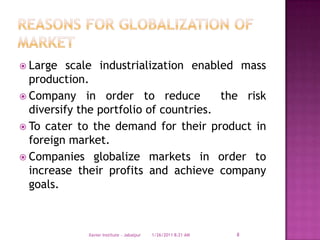Globalization refers to the increasing interconnectedness and interdependence of the world's economies, cultures, and populations. It is driven by a variety of factors, including technological advances, economic policies, and cultural exchange.
One of the main drivers of globalization is technology. The development of transportation, communication, and information technologies has made it easier for people, goods, and ideas to move around the world. The internet, in particular, has played a significant role in connecting people across borders, enabling the exchange of information and ideas on a global scale.
Another driver of globalization is economic policy. Governments around the world have adopted policies that encourage international trade and investment. This includes reducing tariffs and other barriers to trade, negotiating free trade agreements, and promoting foreign direct investment. These policies have helped to create a more integrated global economy, as businesses are able to access new markets and consumers are able to access a wider range of goods and services.
Cultural exchange is also a driving force behind globalization. As people from different countries interact with one another, they exchange ideas and customs, leading to the spread of culture around the world. This cultural exchange can occur through various channels, such as tourism, education, and media.
In addition, demographic changes can also contribute to globalization. As populations grow and urbanize, there is increased movement of people across borders for work, education, and other opportunities. This can lead to the spread of ideas, cultures, and technologies, further contributing to the interconnectedness of the world.
Overall, the drivers of globalization are complex and multifaceted. They include technological advances, economic policies, cultural exchange, and demographic changes, all of which contribute to the increasing interconnectedness of the world's economies, cultures, and populations.







